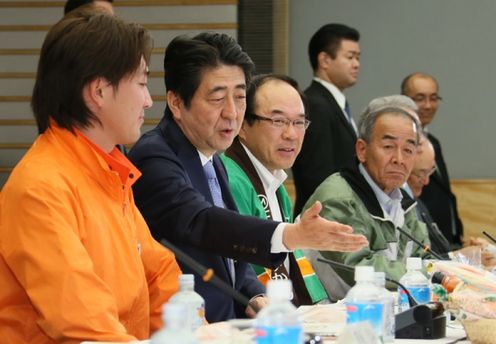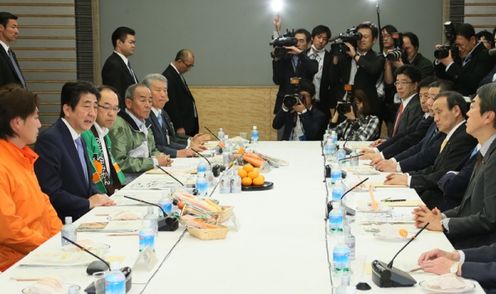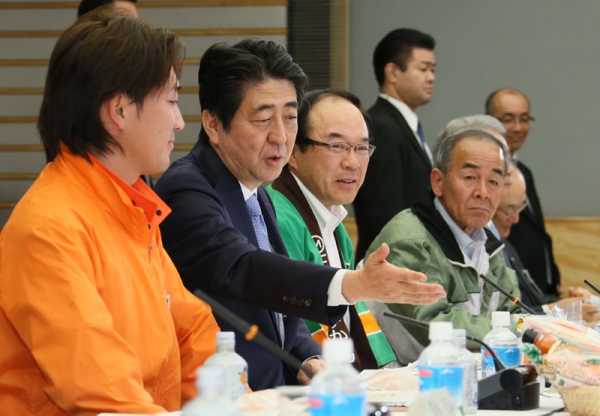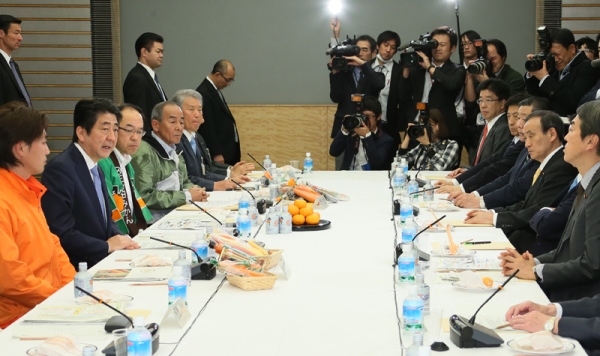Home > News > The Prime Minister in Action > March 2016 > Public-Private Dialogue towards Investment for the Future
The Prime Minister in Action
Public-Private Dialogue towards Investment for the Future
March 4, 2016

Photograph of the Prime Minister making a statement (1)

Photograph of the Prime Minister making a statement (2)
[Provisional Translation]
Prime Minister Shinzo Abe held the fourth meeting of the Public-Private Dialogue towards Investment for the Future at the Prime Minister's Office.
During the dialogue, discussion took place on investment for the future in the regions and other issues.
Based on the discussion, the Prime Minister said,
“We will support efforts to lower production costs and pioneer sales channels overseas in order to increase the income of farmers working so hard in each region. By this autumn, we will formulate reforms related to the reduction of the prices of production goods such as farming equipment and fertilizer, and the distribution of agricultural goods, as well as a new export strategy and export targets. As a part of that, we will support the promotion of Japanese food through such initiatives as the creation of infrastructure for refrigerated distribution in the Middle East and Viet Nam.
We will introduce the latest technology into the agricultural sector. By 2018, we will commercialize automatic driving systems for agricultural equipment operating on cultivated land, and we will create the necessary systems and make other preparations to realize unmanned systems through remote supervision by 2020.
Today, in cooperation with the agricultural and business communities, we have announced our resolve to support hard-working farmers at the local level, and we have been able to confirm the establishment of a system for cooperation. I highly commend these activities. I hope that you will carry out concrete initiatives.
We will support the creation of tourist sites in the regions, and call for investment in them. We will utilize public-private funds and other resources to carry out projects in 100 locations across the country by 2020. We will start this at five locations around Japan as part of a project to promote visits to national parks, aimed at attracting foreign visitors.
From next fiscal year, we will establish graduate schools for tourism management at top Japanese universities. At Wakayama University and other universities, we will foster the human resources that will be central to regional tourism. We will also launch an all-out effort at vocational schools and elsewhere to foster practitioners who can contribute to this field as soon as possible.
We will also promote the taking of leave and the staggering of holiday periods. The business community has announced its intention to increase the number of days off taken by workers by three days. Collaborating with regional companies, we will work for the flexible establishment and staggering of school holidays. We will also encourage public employees to take days off at the same time as those school holidays.
We will aim to double productivity in the service industry by 2020.
By 2020, we will achieve a 10% increase in the growth rate for productivity at 10,000 companies across Japan. We will also create a hospitality license designed to make service quality more visible, and will aim for the licensing of 300,000 companies.
We will establish policies for seven fields, including truck transport, lodging, and supermarkets. These policies will each be suited to the special characteristics of their respective field. We will also provide intensive tax-based and financial support related to that. We have made a Cabinet Decision today on a new bill to that end.
We have established ‘local benchmarks’ to act as indicators for determining the state of the management of regional companies. I want to make use of these, deepen conversations among regional financial institutions, support institutions, and companies, and promote the provision of growth funds to companies that are working hard to increase productivity, without them having to rely on collateral or personal guarantees.
I request that the relevant ministers begin work to create concrete systems related to all of that.
I have a few more remarks I would like to end with. We have at last reached the season for wage increases. To escape the deflation that has continued in Japan for so many years, we need to exert every effort to remove the deflationary mindset in both the public and private sectors. People sometimes say that ‘something that happens twice will happen three times.’ I want to build on the trends over the past two years of large wage rises and promote even further increases. At the same time, we are seeing some fluctuation in the marketplace, but the fundamentals of the Japanese economy are sound, and so I want to request that everyone actively and boldly increase investments.
Today, we have before us many delicious products provided by farmers. I have already tried some juice and some frozen oranges. I finished off everything I tried. I noticed that special care was taken to make the packaging easy to open. The products inside that packaging were also, of course, delicious. In front of us we have a number of wonderful products from Mr. Suzuki that were created in line with efforts for ‘senary,’ or sixth-order, industrialization (in which agricultural, forestry, or fishery operations create new added value by integrating production, processing, and sales and promoting the use of local resources). Today, I feel that we are about to enter an era in which the incomes of farmers increase and young people come to feel that farming is cool.
Let’s all continue to work hard together. Thank you very much.”


